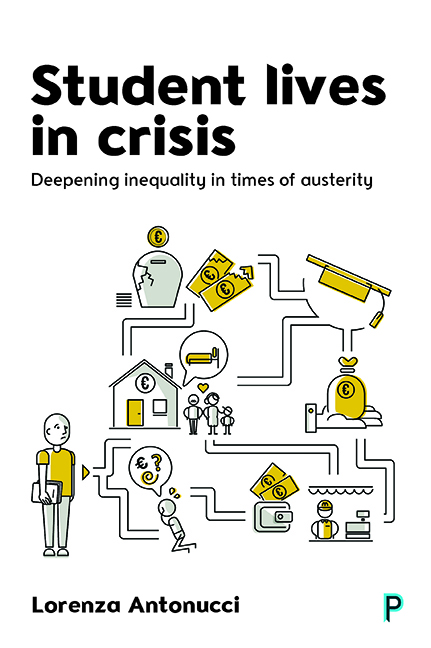Book contents
- Frontmatter
- Dedication
- Contents
- List of tables and figures
- List of acronyms
- Note on author
- Preface: A post-Brexit preface
- Acknowledgements
- Introduction: Young people’s lives at university in crisis
- Part 1 University for all? How higher education shapes inequality among young people
- Part 2 Exploring the inequality of university lives in England, Italy and Sweden
- Part 3 The ‘eternal transition’: young adults and semi-dependence in university
- Conclusion: Addressing growing inequality among young people in university
- Notes
- Annex
- Index
eight - The labour market contradiction: a precarious form of dependence
Published online by Cambridge University Press: 05 April 2022
- Frontmatter
- Dedication
- Contents
- List of tables and figures
- List of acronyms
- Note on author
- Preface: A post-Brexit preface
- Acknowledgements
- Introduction: Young people’s lives at university in crisis
- Part 1 University for all? How higher education shapes inequality among young people
- Part 2 Exploring the inequality of university lives in England, Italy and Sweden
- Part 3 The ‘eternal transition’: young adults and semi-dependence in university
- Conclusion: Addressing growing inequality among young people in university
- Notes
- Annex
- Index
Summary
The second source of welfare used by young people is the labour market. Total dependence on labour market sources is perceived as an achievement of independence, which characterises the state of adulthood. This idea can be challenged to some degree by the fact that, in the current climate, labour market sources do not necessarily guarantee effective independence to adults. Compared to adults, young people do not rely on labour market sources to the same extent, and they are not assumed to be entirely dependent on labour market sources.
As we have seen in Part 1, transitions to work have been replaced by more fragmented and less linear transitions: young people do not necessarily enter the labour market after university, but start participating in it before. Exactly how many enter the labour market tends, however, to vary greatly by country. If we look at the data from Eurostudent in 2011, jobs provide on average at least 20% of students’ monthly income (20% in Portugal, 28% in Germany and 24% in Belgium), 30-50% in many countries (42% in Finland, 37% in the Netherlands, 52% in Spain, 32% in France and 34% in England/ Wales), and reach peaks in Eastern Europe (72% in the Czech Republic and 92% in Slovakia). This variation can be explained by the extent to which the welfare state in each country offers support to young people in university, and also by how easy it is to find a job. Labour market sources are mainly used to complement existing sources, as combining labour market participation with university studies is never easy. There is also a reported trend of more young people looking for labour market participation. This can be explained by the evaluation of the ‘welfare mixes’ presented in Chapter 2: given the trend of austerity that has withdrawn state sources and the increasing demands on the family, young people are under pressure to look more and more to the labour market in order to gain independence. While working might still be defined as the trademark of the transition to adulthood, the ‘final’ position of independence reached by getting a job has become increasingly hard to achieve, and for some young people more than others.
We know relatively little about the types of jobs that young people do while in university, although Eurostat3 indicates that young people aged 18-24 who work while in education tend to be mostly in parttime and temporary jobs, as discussed in Part 1. It is clear, as I go on to show, that during university young people engage mostly in forms of under-employment, in the specific sense of working in unqualified positions.
- Type
- Chapter
- Information
- Student Lives in CrisisDeepening Inequality in Times of Austerity, pp. 131 - 142Publisher: Bristol University PressPrint publication year: 2016



